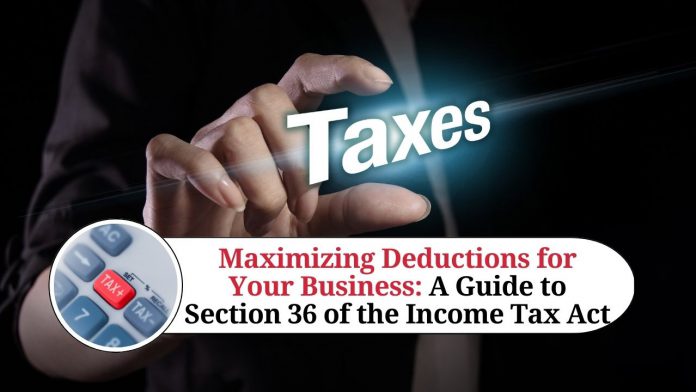Section 36 of the Income Tax Act pertains to the deductions allowed to a taxpayer from their taxable income. These deductions are allowable expenses that are incurred in the course of carrying on business or profession. This section specifies the various types of expenses that can be claimed as deductions, subject to certain conditions.
Let’s take a closer look at the different sub-sections of Section 36:
General deductions: Under this sub-section, any expenditure that is incurred wholly and exclusively to carry on a business or profession is allowed as a deduction. This could include expenses like rent, salaries, wages, insurance, repairs and maintenance, legal fees, and any other expenses that are directly related to the business.
Specific deductions: This sub-section allows for specific deductions that are incurred in the course of carrying on a business. These deductions are listed in detail in the Income Tax Act and include expenses like depreciation on assets, bad debts, research and development expenses, and other similar expenses.
Interest on borrowed capital: This sub-section allows for the deduction of interest paid on borrowed capital. However, there are certain restrictions on the amount of interest that can be claimed as a deduction, depending on the type of borrowing and the purpose of the borrowing.
Employer’s contribution to provident fund: Under this sub-section, the employer’s contribution to the employee’s provident fund is allowed as a deduction.
Reserve for bad and doubtful debts: This sub-section allows for the creation of a reserve for bad and doubtful debts. This reserve can be claimed as a deduction subject to certain conditions.
Securities transaction tax: This sub-section allows for the deduction of securities transaction tax paid on the purchase or sale of securities.
It is important to note that the deductions allowed under Section 36 are subject to certain conditions and limitations. For example, the expenses claimed as deductions must be incurred wholly and exclusively to carry on a business or profession. Additionally, the amount of the deduction may be limited based on the nature of the expense and the type of business being conducted.
Final Conclusion
In conclusion, Section 36 of the Income Tax Act provides for various deductions that can be claimed by taxpayers from their taxable income. These deductions can help to reduce the tax liability of a taxpayer and should be carefully considered when preparing tax returns. It is important to consult with a tax professional or accountant to ensure that all deductions are claimed correctly and by the relevant tax laws.
Read more useful content:
- section 145 of income tax act
- section 10e of income tax act
- section 9 of the income tax act
- section 94b of income tax act
- section 206aa of income tax act
frequently asked questions about Section 36 of the Income Tax Act and deductions for businesses:
Q: What is Section 36 of the Income Tax Act?
A: Section 36 of the Income Tax Act outlines the deductions that businesses can claim on their taxable income. These deductions include expenses that are incurred wholly and exclusively to carry on a business or profession, as well as specific deductions and interest on borrowed capital.
Q: What are general deductions?
A: General deductions are expenses that are incurred wholly and exclusively to carry on a business or profession. Examples of general deductions include rent, salaries and wages, insurance, repairs and maintenance, and legal fees.
Q: What are specific deductions?
A: Specific deductions are expenses that are incurred in the course of carrying on a business, such as depreciation on assets, bad debts, and research and development expenses.
Q: Are there limitations on the number of deductions that can be claimed?
A: Yes, there are limitations on the number of deductions that can be claimed, depending on the type of expense and the nature of the business. For example, the amount of the deduction for interest on borrowed capital may be subject to certain restrictions.
Q: Can the employer’s contribution to an employee’s provident fund be claimed as a deduction?
A: Yes, the employer’s contribution to an employee’s provident fund is allowed as a deduction under Section 36.
Q: What is a reserve for bad and doubtful debts?
A: A reserve for bad and doubtful debts is a provision that businesses can make to account for losses that may be incurred due to customers defaulting on payments. This reserve can be claimed as a deduction subject to certain conditions.
Q: Can securities transaction tax be claimed as a deduction?
A: Yes, securities transaction tax paid on the purchase or sale of securities can be claimed as a deduction under Section 36.
Q: Should businesses consult with a tax professional or accountant when claiming deductions under Section 36?
A: Yes, it is recommended that businesses consult with a tax professional or accountant to ensure that they are claiming all applicable deductions correctly and by the relevant tax laws. This can help to ensure that the business is taking full advantage of the deductions available to them and avoiding any potential penalties or issues with the tax authorities.




















